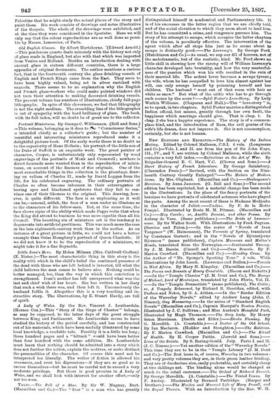TALES. —The Fail of a Star. By Sir W. Magnay, Bart.
(Macmillan and Co.)—The " Star " is a man who has greatly distinguished himself in academical and Parliamentary life. It is of his successes in the latter region that we are chiefly told, and of the social elevation to which they seem about to lead him. But he has committed a crime, and vengeance pursues him. The story of his attempt to escape, which occupies the latter chapters of the volume, is peculiarly effective. The intervention of the agent which after all stops him just as he seems about to escape is distinctly good.—The Larramy's. By George Ford, (Hutchinson and Co.)—As usual, we sup our fill of horrors, not of the melodramatic, but of the realistic, kind. Mr. Ford shows no little skill in showing how the strong will of William Larramy's character developed into brutality, and how the very masterful- ness of the passion which won his wife resulted in the rain of their married life. The ardent lover becomes a savage tyrant; the wife, whom he has compelled to love him almost against her will, can only avenge herself by poisoning herself and her children. The husband " went out of that room with hair as white as snow." But what of the critic who has to go through such scenes by the score P—Sybil Foster's Love-Story. By Lady Watkin Williams. (Chapman and Hall.)—The " love-story " is, so to speak, in two chapters. Sybil Foster marries a distinguished Indian official, but misses, greatly through her own fault, the happiness which marriage should give. That is chap. 1. In chap. 2 she has a happier experience. The story is of a common- place kind, and the introduction of Rare, the evil genius of the wife's life drama, does not improve it. She is not commonplace, certainly, but she is not human.


































 Previous page
Previous page